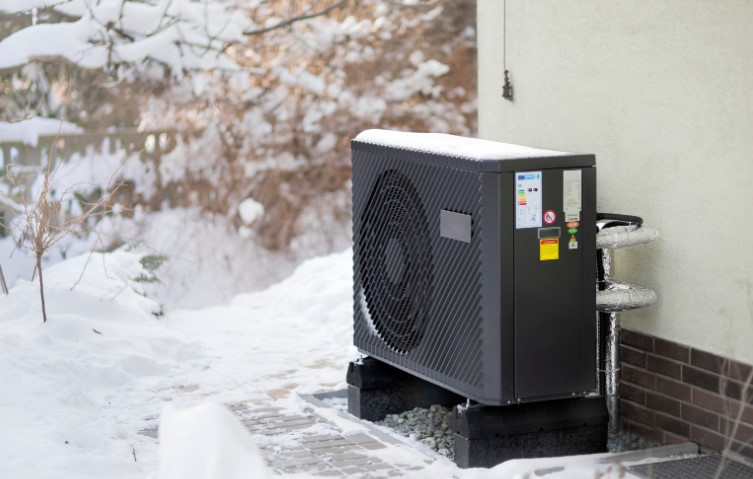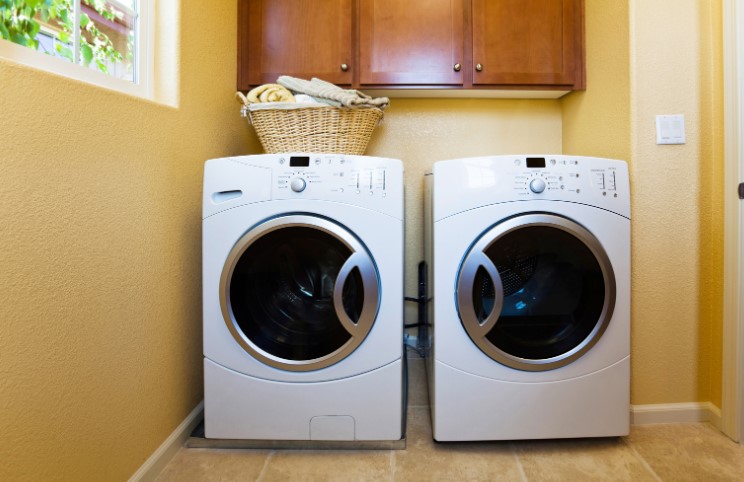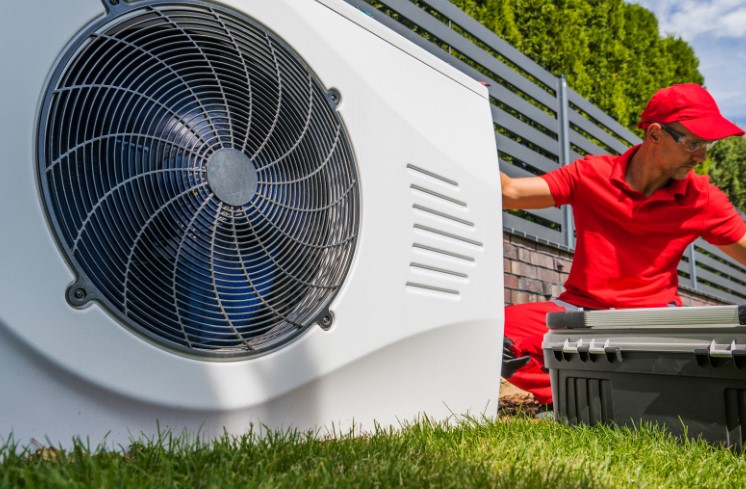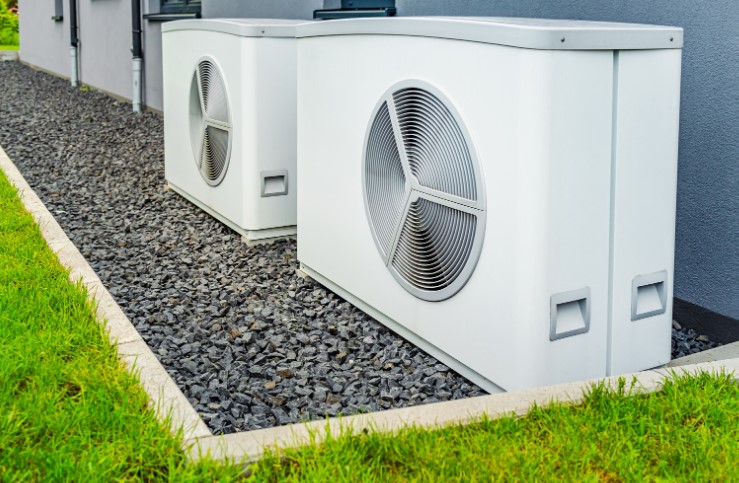- What is a Heat Pump Dryer?
- What is a Condenser Dryer?
- Heat Pump Vs Condenser Dryer: A Comparison
- Heat Pump Vs Condenser Dryer:
- Which One Is More Energy Efficient?
- Which Dryer Is Better for Different UK Households?
- What are the Factors to Consider Before Buying a Dryer?
- Conclusion: Which Dryer Should You Choose?
Choosing the right dryer for your home is a key decision that impacts your energy bills, environmental footprint, and drying efficiency. In the UK, where energy costs are a major concern, selecting between a heat pump dryer and a condenser dryer can feel overwhelming.
In this guide, I’ll walk you through the pros and cons of heat pump vs condenser dryer, helping you make an informed decision based on your household’s specific needs.
What is a Heat Pump Dryer?
A heat pump dryer is an energy-efficient appliance that employs advanced technology to dry clothes by recycling the warm air circulating inside the machine. Instead of venting the warm air outside, the heat pump recaptures and recycles it, reducing overall energy consumption.
How Does a Heat Pump Dryer Work?
A heat pump dryer works by circulating hot air through your clothes to remove moisture. The air is then cooled, causing the moisture to condense, and the water is collected in a reservoir.
Unlike other dryers, this method doesn’t release the warm air but rather recycles it back into the drying drum, making it highly energy-efficient.
What are the Advantages of Heat Pump Dryers?
- Energy savings: Heat pump dryers are highly energy-efficient, using up to 50% less electricity compared to traditional models. This might end up in substantial savings on your energy bills over time.
- Eco-friendly: By reusing the air and consuming less power, these dryers are a more environmentally friendly choice.
- Lower drying temperature: The lower heat is gentler on clothes, helping to preserve fabrics for longer.
What are the Potential Drawbacks of Heat Pump Dryers?
- Higher upfront cost: Heat pump dryers typically come with a higher price tag compared to condenser dryers.
- Longer drying time: Due to the lower temperatures, drying cycles tend to take longer.

What is a Condenser Dryer?
A condenser dryer works by removing moisture from your clothes and collecting the water in a tank or draining it through a hose. Unlike vented dryers, condenser dryers don’t need to be connected to an external vent, making them a more flexible option for homes where venting isn’t possible.
How Does a Condenser Dryer Work?
Condenser dryers pull in air, heat it, and then pass it through the wet clothes. The warm, moisture-laden air is cooled inside the machine, causing the water vapor to condense. The condensed water is stored in a collection tank that needs to be emptied regularly.
What are the Advantages of Condenser Dryers?
- Faster drying time: Condenser dryers typically finishes clothes drying cycles more quickly than heat pump dryers, making them a convenient option for busy households.
- No external venting required: Ideal for homes without a venting system, they can be placed anywhere with access to electricity.
- Lower upfront cost: These dryers are generally more affordable to purchase than heat pump models.
What are the Potential Drawbacks of Condenser Dryers?
- Higher energy consumption: Condenser dryers are less energy-efficient than heat pump dryers, resulting in higher running costs over time.
- Regular maintenance: The water tank needs to be emptied frequently, and the condenser filter should be cleaned to ensure optimal performance.

Heat Pump Vs Condenser Dryer: A Comparison
To help you compare both types of dryers at a glance, here’s a breakdown of their key features:
| Aspect | Heat Pump Dryer | Condenser Dryer |
| Energy Efficiency | Very energy-efficient, lower running cost | Less efficient, higher energy usage |
| Upfront Cost | Higher initial investment | Lower initial cost |
| Drying Time | Longer drying cycles | Faster drying cycles |
| Maintenance | Less frequent maintenance | Requires regular emptying of water tank |
| Environmental Impact | Eco-friendly and reduces carbon footprint | Less environmentally friendly |
| Noise Levels | Lower noise levels | Higher noise levels |
Heat Pump Vs Condenser Dryer:
Which One Is More Energy Efficient?
In terms of energy efficiency, heat pump dryers are the clear leader. These dryers operate at a lower temperature and reuse heat, significantly reducing electricity consumption. While a condenser dryer is more affordable initially, the higher running costs can add up over time, especially for households that use their dryer frequently.
What are the Environmental Impact?
By using less energy and generating less heat, heat pump dryers have a smaller carbon footprint, making them the more eco-friendly option for UK households looking to reduce their environmental impact.
What are the Running Costs?
Over a 5-10 year period, the running costs of a heat pump dryer are typically lower due to their energy efficiency. Here’s a quick breakdown:
| Dryer Type | Upfront Cost | Estimated Annual Energy Cost | Total Cost Over 5 Years |
| Heat Pump Dryer | £500-£1,000 | £30-£50 | £650-£1,250 |
| Condenser Dryer | £250-£500 | £80-£100 | £650-£1,000 |
Which Dryer Is Better for Different UK Households?
Choosing the right dryer depends on your household size, drying needs, and available space. Let’s explore which type suits different living situations.
Which is the Best Dryer for Small Homes?
If you live in a small apartment or home where space is at a premium, a condenser dryer is a great choice. Its ability to operate without an external vent makes it flexible for smaller spaces.
Which is the Best Dryer for Large Families?
For larger families that need to run multiple loads each week, a heat pump dryer might be the best long-term investment. The reduced running costs and gentler drying process will save you money and extend the life of your clothing.
What are the Factors to Consider Before Buying a Dryer?
Before making your final decision, consider the following factors to ensure you choose the right dryer for your needs:
How is the Noise Levels and Convenience?
Heat pump dryers are generally quieter than condenser dryers, which can be an important factor if your dryer is located near living areas. Additionally, heat pump dryers require less frequent maintenance, making them more convenient in the long run.
What is the Drying Time and Performance?
When comparing drying times, condenser dryers often finish the job faster. However, if you’re looking for a balance between efficiency and gentleness on your fabrics, the slower drying time of a heat pump dryer might be worth it in the long run.

Conclusion: Which Dryer Should You Choose?
If you’re seeking an energy-efficient and eco-friendly choice and are ready to invest a bit more initially, a heat pump dryer is your best option. It will save you money on your energy bills over time, and its gentle drying process will protect your clothes.
On the other hand, if you want a more budget-friendly dryer with quicker drying times and don’t mind the higher running costs, a condenser dryer may be the better option for you.
Ultimately, the choice depends on your household’s specific needs, budget, and preferences. Whatever you choose, both dryers offer excellent solutions for modern living in the UK.


0 Comments